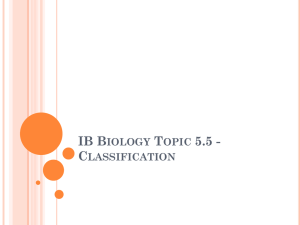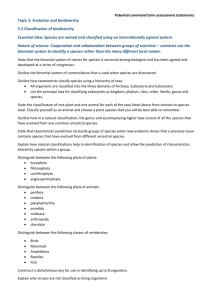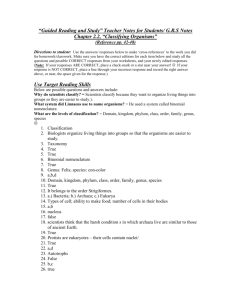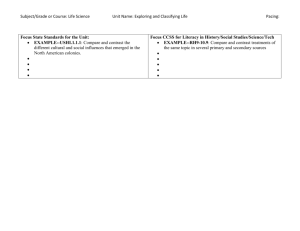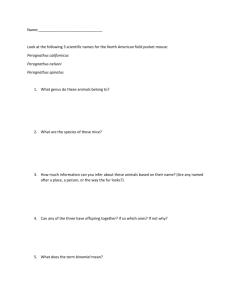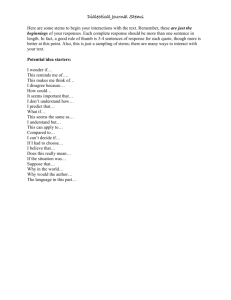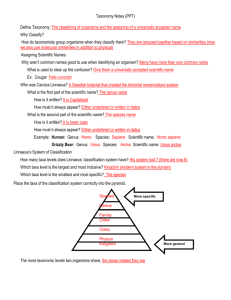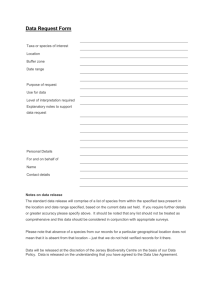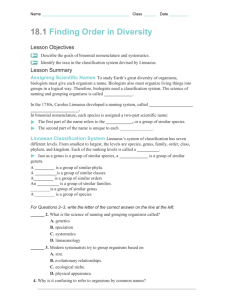Topic 5: Ecology and ecosystems - wfs
advertisement
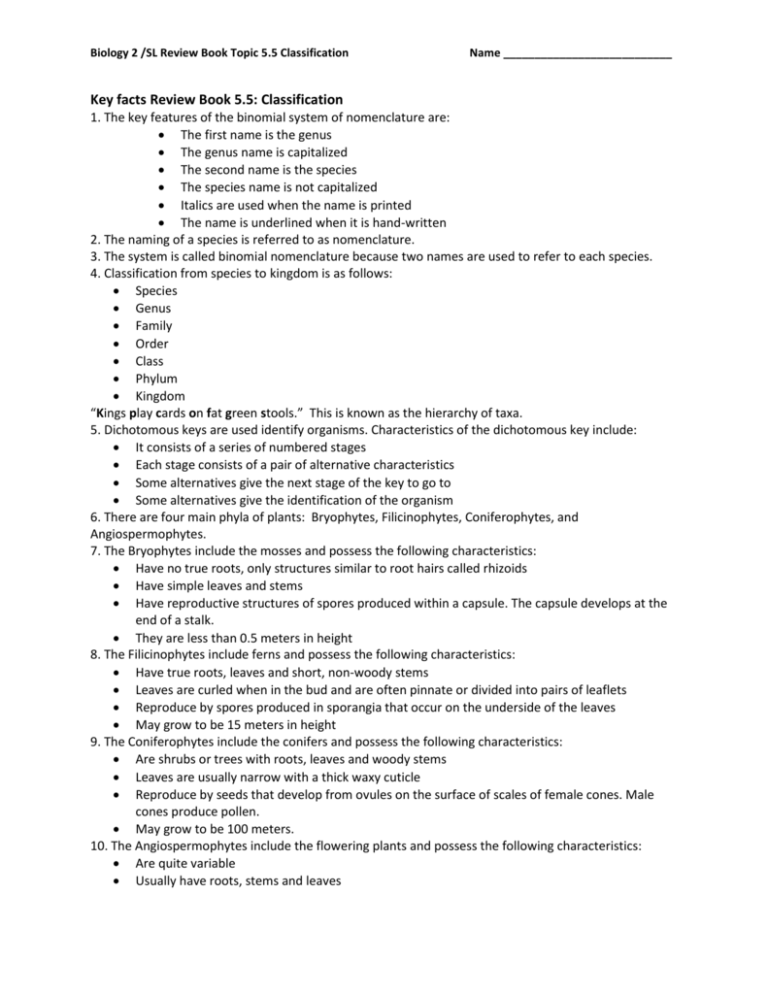
Biology 2 /SL Review Book Topic 5.5 Classification Name ___________________________ Key facts Review Book 5.5: Classification 1. The key features of the binomial system of nomenclature are: The first name is the genus The genus name is capitalized The second name is the species The species name is not capitalized Italics are used when the name is printed The name is underlined when it is hand-written 2. The naming of a species is referred to as nomenclature. 3. The system is called binomial nomenclature because two names are used to refer to each species. 4. Classification from species to kingdom is as follows: Species Genus Family Order Class Phylum Kingdom “Kings play cards on fat green stools.” This is known as the hierarchy of taxa. 5. Dichotomous keys are used identify organisms. Characteristics of the dichotomous key include: It consists of a series of numbered stages Each stage consists of a pair of alternative characteristics Some alternatives give the next stage of the key to go to Some alternatives give the identification of the organism 6. There are four main phyla of plants: Bryophytes, Filicinophytes, Coniferophytes, and Angiospermophytes. 7. The Bryophytes include the mosses and possess the following characteristics: Have no true roots, only structures similar to root hairs called rhizoids Have simple leaves and stems Have reproductive structures of spores produced within a capsule. The capsule develops at the end of a stalk. They are less than 0.5 meters in height 8. The Filicinophytes include ferns and possess the following characteristics: Have true roots, leaves and short, non-woody stems Leaves are curled when in the bud and are often pinnate or divided into pairs of leaflets Reproduce by spores produced in sporangia that occur on the underside of the leaves May grow to be 15 meters in height 9. The Coniferophytes include the conifers and possess the following characteristics: Are shrubs or trees with roots, leaves and woody stems Leaves are usually narrow with a thick waxy cuticle Reproduce by seeds that develop from ovules on the surface of scales of female cones. Male cones produce pollen. May grow to be 100 meters. 10. The Angiospermophytes include the flowering plants and possess the following characteristics: Are quite variable Usually have roots, stems and leaves Biology 2 /SL Review Book Topic 5.5 Classification Name ___________________________ The stems of shrubs and trees are woody Reproduce by seeds that develop from ovules inside ovaries. The ovaries are parts of flowers. Fruits develop from the ovaries, to disperse the seed. May grow to 100 meters in height 11. There are 6 phyla of animals to be aware of: Porifera, Cnidaria, Platyhelminths, Annelida, Mollusca, and Arthropoda. 12. Porifera characteristics: No clear symmetry Attached to a surface Pores throughout body No mouth or anus Example: sponges 13. Cnidaria characteristics: Radially symmetric Tentacles present Possess stinging cells Have a moth but no anus Examples: jellyfish, corals, sea anemones 14. Platyhelminths characteristics: Bilaterally symmetrical Flat bodies Unsegmented bodies Mouth but no anus Examples: planaria, tapeworms, liverflukes 15. Annelida characteristics: Bilaterally symmetrical Bristles are often present Segmented bodies Mouth and anus present Examples: earthworms, leeches, ragworms 16. Mollusca characteristics: Muscular foot and mantle Shell usually present Segmentation not visible Possess mouth and anus Examples: slugs, snails, clams, squids 17. Arthropoda characteristics: Bilaterally symmetric Exoskeleton present Segmented body Jointed appendages Examples: insects, spiders, crabs millipedes Additional notes Biology 2 /SL Review Book Topic 5.5 Classification Name ___________________________ Complete the following. 56. What two taxa are used in the binomial nomenclature for an organism? 57. List the seven-level hierarchy of taxa. 58. Name the 5 major kingdoms of life recognized by many biologists. 59. Complete the following table. Taxa Human Garden pea Kingdom Phylum Class Order Family Genus Species 60. Name the major 4 plant phyla and give two major characteristics of each. 61. Name the proper phylum for each of the following animals. a. earthworm___________________ b. planaria_____________________ c. jellyfish_____________________ d. insects______________________ e. clams_______________________ f. sponges______________________ g. squid________________________ Biology 2 /SL Review Book Topic 5.5 Classification Name ___________________________ 62. Copy a dichotomous key used for species identification and paste it on this page Biology 2 /SL Review Book Topic 5.5 Classification Name ___________________________ Topic 5: Ecology and evolution word search B X D S G E Z N V J S S A F E V O L U T I O N H O F Q B X G Z N G A R O E Y K G C F L S D U U Z N K M A Z P H U I X R T A U Y S Z I O E U I Z E O G F N T K O R W M E K B A W O Q I N A L A A G O U Y S U J L O G O X L A H K L W X X Z G W O X F M C K L H E P F Q M D G X Q N Z I V K P E B G G U Y O C A K Y K X K E U U A U W X T T M J A G R O Y A F I V W H A B I T A T C E W Y K J Y I C Y D R C Y G B D C Z B M R H R V A E M I F O M C C F N X P E I D E F G C X U H E F C B R I K I E L J W G X J P S C C A O V E E F H Z J X C S G C A D N S V F D Z Y D U G A O T F D F S A P R O T R O P H S W K O M C Q L X I I G R S I Q Y Z K R H P A L E U K D L J X Y E V D E M C B Y S Y O V Z U Q K T P P N H O Z M Q D B A N R R L X H Y L G S N R Q U I T T W E N M N B Q N T J H H A M Z L O U A K T C Q O N B C T A Q O J T X L X X Z N T P E Z R T Z K A E N I Y T E V I P I V L B A T C U N R O X V W W O Z C I M C K R B I O S P H E R E P X J B R M U E A I T M B K U U O Q I A I P F B P O Y H H C E I T F V W T K O O Z P T X I N U O V E J L Y M A I H Y G C Z R E S S G U U R A U T O T R O P H A E M S G X W K G H X C B Z U O O S N H V M C N N C G T N P N H X M O R T A L I T Y P I T X V Y I F U D D U E G V J Y D R B B M X T Q T H H V K Z V P A R D W I X A G A I H Z W G J O I A H N R B X X B T S L U D A K E U G R Y M T J C K V I R W Z A M O F D E T R I T I V O R E S I Autotroph Ecosystem Natality Binomial Emigration Plateau Biosphere Evolution Producers Decomposers Habitat Saprotrophs Detritivores Heterotroph Sigmoid Dichotomous Immigration Species Ecology Mortality Variatio L D A V S I M M I G R A T I O N J K J V F W H E B O C W E W H E A D E C O M P O S E R S Y J O I S R Q A W P
